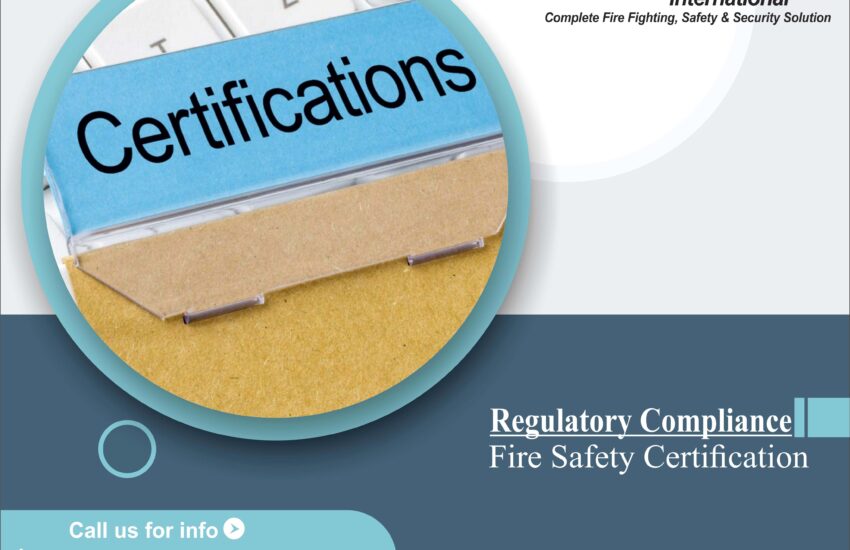Fire Safety Certification is an official document issued by a competent authority or fire safety engineer confirming that a building or workplace complies with all applicable fire safety regulations. It ensures that the property is equipped with the necessary fire protection systems, evacuation procedures, and safety protocols to prevent and respond to fire-related incidents.
Why is Fire Safety Certification Important?
- ✅ Legal Compliance: Local authorities and building codes require valid fire safety certificates for occupancy or operation.
- ✅ Risk Mitigation: Ensures proactive fire risk management by identifying hazards and implementing safety measures.
- ✅ Insurance Compliance: Many insurance companies demand valid fire safety compliance to maintain coverage or reduce premiums.
- ✅ Life Safety: Protects the lives of occupants by ensuring that early warning systems, escape routes, and firefighting equipment are in place.
- ✅ Operational Continuity: Prevents business disruptions and legal liabilities caused by non-compliance or fire incidents.
Types of Fire Safety Certification
1. Building Fire Safety Certificate
Required for commercial, industrial, and residential buildings, confirming compliance with building fire safety standards.
2. Workplace Fire Safety Certification
Ensures that all necessary fire prevention and response measures are implemented in the workplace.
3. Fire Extinguisher Certification
Covers inspection, testing, and tagging of fire extinguishers, confirming they are operational and compliant.
4. Fire Alarm System Certification
Verifies that fire alarms are installed correctly and regularly tested to meet fire code requirements.
Key Elements of Fire Safety Certification
- 🔍 Fire Risk Assessment
- 🚪 Emergency Exit Signage and Lighting
- 🚒 Fire Alarm and Detection Systems
- 🧯 Fire Extinguishers and Suppression Systems
- 📋 Evacuation Plans and Fire Drills
- 📚 Fire Safety Training for Staff
- 🧰 Maintenance and Testing of Equipment
- 📑 Fire Safety Audit and Documentation
Who Needs Fire Safety Certification?
- Commercial property owners
- Facility managers
- Landlords and real estate developers
- Office and retail businesses
- Hospitality and healthcare facilities
- Educational institutions
- Manufacturing plants and warehouses
If your premises are occupied by the public, employees, or tenants, fire safety certification is a legal and moral obligation.
How to Get Fire Safety Certified
- Consult a Fire Safety Expert or Certified Inspector
- Conduct a Full Fire Risk Assessment
- Install and Maintain Required Fire Protection Equipment
- Develop an Emergency Action Plan
- Schedule an Inspection with the Local Fire Authority or Certifying Body
- Pass Inspection and Receive Fire Safety Certificate
Fire Safety Regulations & Codes (Global Standards)
Fire safety requirements vary by region but often follow these internationally recognized standards:
- NFPA (USA): National Fire Protection Association Codes (e.g., NFPA 1, NFPA 101 Life Safety Code)
- BS 9999 (UK): Code of Practice for Fire Safety in the Design, Management and Use of Buildings
- ISO 45001: International standard for occupational health and safety management
- AS 1851 (Australia): Routine service of fire protection systems and equipment
- EN 54 (EU): European standard for fire detection and alarm systems
Ensure your facility meets the latest fire code compliance based on your local authority having jurisdiction (AHJ).
How Often Should Fire Safety Certification Be Renewed?
- 🔁 Typically annually or every 2–3 years
- 🧪 Fire extinguishers and alarms require regular inspections (monthly, quarterly, or annually depending on system type)
- 🔄 Fire safety audits may be required more frequently for high-risk facilities
Always stay updated on your certification renewal deadlines to maintain compliance.
Benefits of Fire Safety Certification
- 🛡️ Legal protection and code compliance
- 🔥 Reduced fire hazards and incidents
- 🧾 Lower insurance premiums
- 🧠 Peace of mind for staff and visitors
- 🧯 Ready access to well-maintained fire equipment
- 🕒 Faster emergency response and evacuation readiness
Conclusion
Fire Safety Certification is a critical aspect of any responsible building management or business operation. It’s more than just a legal checkbox—it’s a commitment to safety, preparedness, and ethical responsibility. From ensuring compliant fire protection systems to conducting fire safety training, the certification process helps safeguard lives and property.


